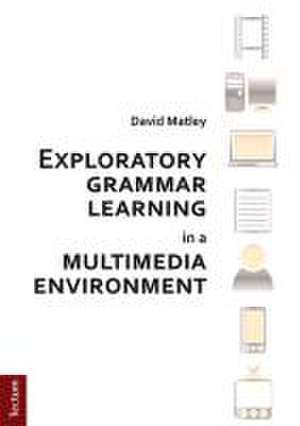Exploratory grammar learning in a multimedia environment
Autor David Matleyen Limba Engleză Hardback – 25 iun 2012
How do second language (L2) learners go about learning English grammar? How do they make use of their knowledge of a second language when working with computer-assisted language learning (CALL) materials? What role do individual differences play in the way in which learners work together in language-learning activities? Why are some learners resistant to instruction? These are the questions that this book addresses. Written in a readable and engaging style, the book takes an undogmatic and refreshing look at second language acquisition (SLA) research and investigates what learners actually do when working with L2 learning materials. The chapters include: An up-to-date review of the history of SLA as a field of research. An in-depth overview of the role played by explicit knowledge of L2 grammar. A critical discussion of the role of grammar instruction. An outline of the impact of individual factors on the L2 acquisition process. Key insights into the potential of multimedia CALL for L2 learning. Written by a researcher with many years of English teaching experience at university and secondary school level, it addresses the concerns of teachers, CALL practitioners and SLA researchers alike, providing insights from the interface of SLA theory and hands-on L2 pedagogy.
Preț: 338.88 lei
Nou
64.84€ • 70.66$ • 54.64£
Carte indisponibilă temporar
Specificații
ISBN-10: 3828829503
Pagini: 528
Dimensiuni: 157 x 221 x 38 mm
Greutate: 0.77 kg
Ediția:
Editura: Tectum Verlag
Cuprins
Acknowledgements Introduction 1 Changing approaches to second language acquisition research 1.1 The role of theory within second language acquisition research 1.2 The paradigm shift away from behaviourism 1.3 A permeable and dynamic system: interlanguage 1.4 'Learning' vs. 'acquisition' and the role of explicit knowledge 1.5 Universal Grammar approaches to L2 learning 1.6 Cognitive approaches to SLA 1.7 Conclusion 2 The role of explicit and implicit knowledge in L2 learning 2.1 Explicit vs. implicit knowledge 2.2 The interface issue: How do explicit and implicit knowledge interact? 2.3 Conclusion 3 Types of instruction and L2 grammar learning 3.1 Models of L2 instruction 3.2 Measuring the effectiveness of instruction 3.3 Results of empirical studies of explicit instruction 3.4 Conclusion 4 The role of the learner in L2 learning 4.1 Learning style 4.2 Learning strategies 4.3 Motivation 4.4 Conclusion 5 The role of the computer in L2 learning 5.1 Constructivist approaches to L2 learning 5.2 Hypermedia as cognitive tools for L2 learning 5.3 Learner autonomy and CALL 5.4 L2 learning tasks and CALL 5.5 Conclusion 6 The quantitative study 6.1 Pedagogical rationale and research questions 6.2 Participants and course design 6.3 Quantitative assessment 6.4 Data analysis 6.5 Discussion and conclusion 7 Description of the qualitative study 7.1 Aims of the study and research questions 7.2 Software and learning materials 7.3 Participants 7.4 Test methods 7.5 Analysis of cognitive processes 7.6 Concluding remarks 8 Use of subjects' existing explicit knowledge 8.1 Statement and elaboration of explicit knowledge 8.2 Dealing with uncertainty 8.3 Failure to notice a gap 8.4 Conclusion 9 Use of grammar explanations in the software 9.1 Confirming the subjects' own formulation 9.2 Noticing 9.3 Hypothesis formulation and testing 9.4 Conclusion 10 Use of other sources of explicit knowledge 10.1 Hypothesis formulation and testing 10.2 Use of explicit knowledge when using video excerpts 10.3 Conclusion 11 Summary and conclusion 11.1 The nature of learner knowledge of the L2 11.2 Learners' use of explicit knowledge 11.3 The impact of individual learner factors 11.4 The pedagogical relevance of multimedia CALL 11.5 Strengths and weaknesses of the study 11.6 Outlook for future research Appendices Appendix A: Assignment texts Appendix B: Transcripts of video excerpts Appendix C: Native speaker explanations of assignment forms Appendix D: Learner profile data Appendix E: Pretests and posttests in the qualitative study Appendix F: Learner profile questionnaire (qualitative study) Appendix G: Abbreviations of tense forms Bibliography Index
